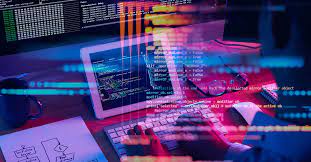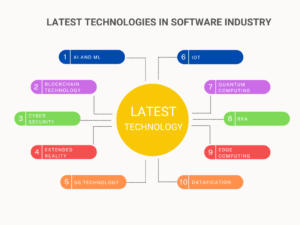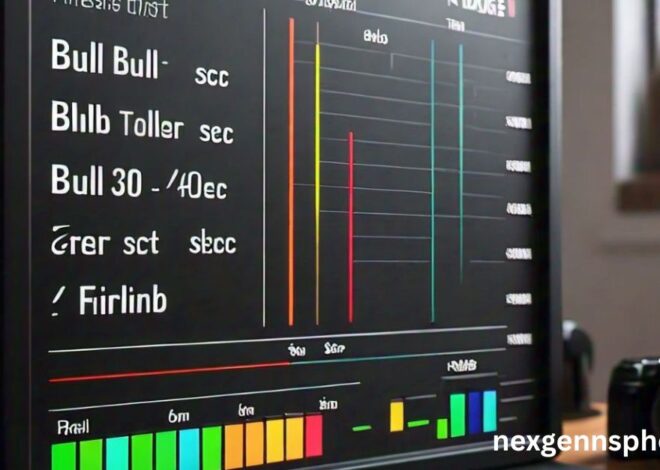
latest technologies in software
In today’s fast-paced digital landscape, software technologies are continually evolving, shaping the way we interact with technology and the world around us. From artificial intelligence (AI) to blockchain and beyond, the latest advancements in software are revolutionizing industries and driving innovation at an unprecedented rate. We’ll discuss in this article about latest technologies in software.
Artificial Intelligence and Machine Learning
Artificial intelligence (AI) and machine learning (ML) have emerged as key drivers of innovation in the software industry. AI algorithms enable computers to perform tasks that traditionally require human intelligence, such as natural language processing, image recognition, and decision-making. ML algorithms allow software systems to learn from data and improve over time, leading to more accurate predictions and insights. We’ll discuss in this article about latest technologies in software.
In software development, AI and ML are being utilized in various applications, including chatbots for customer service, recommendation systems for personalized content delivery, and predictive analytics for forecasting trends. These technologies are transforming industries such as healthcare, finance, and transportation, enhancing efficiency and driving growth.
Internet of Things (IoT)
The Web of Things (IoT) alludes to the organization of interconnected gadgets inserted with sensors, programming, and different advances, empowering them to gather and trade information. IoT has significant implications for software innovation, enabling seamless communication between devices and enabling the development of smart systems and applications.
In industries such as manufacturing, healthcare, and agriculture, IoT solutions are being deployed to optimize processes, monitor equipment performance, and improve decision-making. From smart home devices to industrial automation systems, IoT is revolutionizing how we interact with technology and the world around us. We’ll discuss in this article about latest technologies in software.
Blockchain Technology
Blockchain technology, originally devised for digital currencies like Bitcoin, has evolved into a powerful tool for software innovation. Blockchain is a decentralized and distributed ledger technology that enables secure and transparent transactions without the need for intermediaries.
In addition to cryptocurrencies, blockchain technology is being used in various applications, including supply chain management, identity verification, and voting systems. Its decentralized nature ensures data integrity and immutability, making it ideal for applications where trust and security are paramount.
Augmented Reality (AR) and Virtual Reality (VR)
Augmented reality (AR) and virtual reality (VR) are immersive technologies that blend the physical and digital worlds, creating interactive experiences for users. AR overlays advanced content onto this present reality, while VR establishes completely virtual conditions. We’ll discuss in this article about latest technologies in software.
These innovations have applications across different enterprises, from gaming and amusement to instruction and medical services. In software development, AR and VR are being used to create immersive training simulations, interactive product experiences, and virtual collaboration platforms, enhancing user engagement and driving innovation.
Edge Computing

Edge registering is a circulated processing worldview that carries calculation and information stockpiling nearer to the wellspring of the information age. By processing data locally at the edge of the network, edge computing reduces latency and bandwidth usage, enabling real-time applications and services. We’ll discuss in this article about latest technologies in software.
In software development, edge computing is enabling new opportunities for innovation, particularly in IoT, autonomous vehicles, and industrial automation. By harnessing the power of edge devices, software developers can deliver faster and more responsive applications, enhancing user experiences and enabling new use cases.
Quantum Computing
Quantum registering is a progressive figuring worldview that uses the standards of quantum mechanics to perform calculations at a dramatically quicker rate than traditional PCs. Dissimilar to traditional PCs, which utilize paired bits, quantum PCs use quantum bits or qubits, which can exist in different states all the while. We’ll discuss in this article about latest technologies in software.
While still in its beginning phases, quantum registering can reform fields like cryptography, improvement, and medication disclosure. In software development, quantum computing could enable the development of new algorithms and applications that were previously thought to be impossible, opening up new frontiers in computing.
Cybersecurity Measures
As software technologies continue to advance, cybersecurity remains a top priority for organizations and individuals alike. With cyber threats becoming more sophisticated and prevalent, it’s essential to implement robust cybersecurity measures to protect sensitive data and systems. We’ll discuss in this article about latest technologies in software.
Innovations in software security, such as encryption, authentication, and intrusion detection, are crucial for safeguarding against cyber attacks. Additionally, advancements in AI and machine learning are being leveraged to detect and mitigate security threats in real time, enhancing overall cybersecurity posture.
Latest technologies in software
In the ever-evolving landscape of software development, several latest technologies are shaping the industry’s future. One prominent trend is the rise of artificial intelligence (AI) and machine learning (ML) technologies, which are revolutionizing various sectors with their ability to automate tasks, analyze data, and make intelligent decisions.
Another significant advancement is the adoption of cloud computing, enabling scalable and flexible infrastructure for software deployment and management. Additionally, containerization technologies like Docker and Kubernetes are gaining popularity for streamlining application deployment and management across different environments. We’ll discuss in this article about latest technologies in software.
Furthermore, serverless computing is emerging as a paradigm shift, allowing developers to focus solely on writing code without worrying about managing infrastructure. Moreover, blockchain technology continues to disrupt industries by providing transparent, decentralized, and secure solutions for various applications, such as financial transactions and supply chain management. Overall, staying abreast of these latest technologies is crucial for software developers and businesses to remain competitive in today’s dynamic digital landscape.
Cloud Computing
Cloud computing has transformed the way software is developed, deployed, and managed. By providing on-demand access to computing resources over the internet, cloud computing enables organizations to scale their infrastructure dynamically and reduce operational costs. We’ll discuss in this article about latest technologies in software.
In software development, cloud computing offers benefits such as flexibility, scalability, and reliability. Developers can leverage cloud services for storage, computing, and networking, allowing them to focus on building and deploying applications without worrying about the underlying infrastructure.
Automation and DevOps
Automation and DevOps practices are revolutionizing the software development lifecycle, enabling organizations to deliver high-quality software faster and more efficiently. Automation tools automate repetitive tasks such as code deployment, testing, and monitoring, reducing manual effort and increasing productivity. We’ll discuss in this article about latest technologies in software.
DevOps practices emphasize collaboration and communication between development and operations teams, ensuring that software is delivered rapidly and reliably. By embracing automation and DevOps, organizations can accelerate time-to-market, improve software quality, and enhance overall business agility.
Data Science and Analytics

Data science and analytics play a critical role in driving insights and informing decision-making in software development. By analyzing large volumes of data, organizations can uncover valuable insights, identify trends, and make data-driven decisions.
In software development, data science techniques such as machine learning and predictive analytics are used to enhance user experiences, optimize processes, and drive innovation. From recommendation engines to predictive maintenance systems, data science is powering the next generation of intelligent software solutions.
Mobile and Web Development Frameworks
Mobile and web development frameworks provide developers with the tools and libraries needed to build responsive and scalable applications for various platforms. These frameworks simplify the development process, allowing developers to focus on building features and functionality rather than low-level implementation details. We’ll discuss in this article about latest technologies in software.
Popular frameworks such as React, Angular, and Vue.js are widely used for building modern web applications, while frameworks like Flutter and React Native are preferred choices for cross-platform mobile development. By leveraging these frameworks, developers can build high-quality software more efficiently and cost-effectively.
Voice Recognition Technology
Voice recognition technology enables computers to understand and interpret human speech, opening up new possibilities for human-computer interaction. From virtual assistants like Siri and Alexa to voice-enabled devices and applications, voice recognition technology is becoming increasingly ubiquitous. We’ll discuss in this article about latest technologies in software.
In software development, voice recognition technology is being integrated into various applications, including voice-controlled smart home devices, dictation software, and voice-enabled customer service systems. By enabling hands-free interaction and natural language processing, voice recognition technology enhances user convenience and accessibility.
User Experience (UX) Design Trends
User experience (UX) design plays a crucial role in shaping the success of software products. By focusing on the needs and preferences of users, UX designers create intuitive and engaging interfaces that enhance usability and satisfaction.
In today’s digital landscape, UX design trends are constantly evolving, driven by changes in technology and user behavior. From minimalist interfaces to immersive experiences, UX designers are exploring new ways to create memorable and impactful user experiences.
Conclusion
In conclusion, the latest technologies in software are driving innovation and reshaping the way we interact with technology. From artificial intelligence and blockchain to edge computing and quantum computing, these advancements are opening up new possibilities for software development and unlocking new opportunities for businesses and individuals alike. We’ll discuss in this article about latest technologies in software. By staying informed about the latest trends and embracing emerging technologies, organizations can stay ahead of the curve and harness the power of software innovation to drive growth and success.
FAQs (Frequently Asked Questions)
- What are the key trends in software development?
- The key trends in software development include artificial intelligence, blockchain technology, the Internet of Things, edge computing, and cloud computing, among others. We’ll discuss in this article about latest technologies in software.
- How is AI impacting software development?
- AI is transforming software development by enabling automation, predictive analytics, and personalized experiences, among other applications.
- What are the benefits of cloud computing for software development?
- Cloud computing offers benefits such as scalability, flexibility, and cost-effectiveness, allowing developers to focus on building and deploying applications without worrying about infrastructure.
- How can organizations enhance cybersecurity in software development?
- Organizations can enhance cybersecurity in software development by implementing robust security measures such as encryption, authentication, and intrusion detection, as well as leveraging AI and machine learning for threat detection and mitigation. We’ll discuss in this article about latest technologies in software.
- What role does UX design play in software development?
- UX design plays a crucial role in software development by creating intuitive and engaging interfaces that enhance usability and satisfaction for users.


